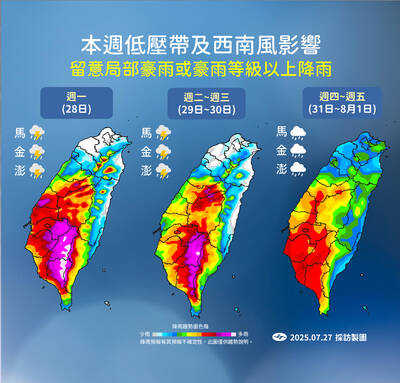The National Science Council yesterday inaugurated the Hsinchu Biomedical Science Park with the aim of putting Taiwan on the map with advanced biotechnology and rejuvenating the nation's economy.
With the post-war baby boom generation starting to go into retirement, the healthcare and pharmaceuticals industry is estimated to represent a US$200 billion market worldwide, said Hsinchu Science Park administration director-general Huang Der-ray (
"Taiwan's current market share in these industries is a mere 0.5 percent, but with the Hsinchu Biomedical Science Park we are banking on adding NT$100 billion [US$3.2 billion] to the nation's annual revenue," he said.
Several factors would contribute to creating a hub for domestic and international biotechnology as well as high-end healthcare equipment in the park, where pharmaceutical companies could congregate and lead industries in other parts of the nation, President Chen Shui-bian (陳水扁) said at the opening ceremony.
"The development of the park testifies to the government's determination to invigorate Taiwan's economy and develop high-tech industries, particularly those related to biotechnology," he said.
The National Development Fund has allocated NT$30 billion as investment seed money for firms investing in the new biotechnology park, he said.
With the legislature's approval of the Biotech and New Pharmaceutical Development Act (生技新藥產業發展條例) last June, business owners at the park would enjoy extremely favorable tax breaks and rent control policies, which could foster growth in the time-and-money-consuming industry, he said.
Huang said the park would be home to a comprehensive cluster of biotechnological establishments.
In addition to private companies, the government plans to build an incubation center for innovation development and talent training, a world-class medical center developed under a build-operate-transfer model, a Centers for Disease Control office and an exhibition center, he said.
"The Hsinchu Science Park administration will also encourage world-leading firms to set up shop in the biomedical park, banking on the successes we have achieved at the Hsinchu Science Park," Huang said.
"Whenever a new medicine or innovation is developed, we will have trained personnel to walk the companies through FDA [US Food and Drug Administration] or CE [a product marking applying to products regulated by the European Commission's health standards] certification procedures to help open up international markets," he said.
The park has the geographic advantage of being located between the Hsinchu and the Mid-Taiwan Science Parks, in addition to being right next to both the Sun Yat-sen Freeway and the Taiwan High Speed Rail Hsinchu station, which would also help to draw investors' attention, he said.
"So far we have spoken to a couple of dozen interested firms, both foreign and domestic, about the possibility of setting up shop here," Huang said.
He said that plant construction could start immediately, and, with 82 hectares of land in reserve, the 38-hectare park had ample room for expansion.
The Hsinchu Science Park administration is also looking to open Miaoli County's Tongluo Science Park, which is targeting low-pollution, high-tech industries such as microchip design, information technology and solar energy, Huang said.
Talks have been initiated with US Internet giant Google, although a final agreement has not been reached, he said.
"With forest conservation areas covering 140 hectares of the 350-hectare park, the environmental impact review regulations are much more stringent here than in other science parks," Huang said.
"A biking trail girding the park, hiking trails into the forest conservation areas ... and the view from the park looking out to a sea of green forests will no doubt make the Tongluo park the most eco-friendly high-tech park in Taiwan," he said.

The Central Weather Administration (CWA) today issued a "tsunami watch" alert after a magnitude 8.7 earthquake struck off the Kamchatka Peninsula in northeastern Russia earlier in the morning. The quake struck off the east coast of the Kamchatka Peninsula at 7:25am (Taiwan time) at a depth of about 19km, the CWA said, citing figures from the Pacific Tsunami Warning Center. The CWA's Seismological Center said preliminary assessments indicate that a tsunami could reach Taiwan's coastal areas by 1:18pm today. The CWA urged residents along the coast to stay alert and take necessary precautions as waves as high as 1m could hit the southeastern

The National Museum of Taiwan Literature is next month to hold an exhibition in Osaka, Japan, showcasing the rich and unique history of Taiwanese folklore and literature. The exhibition, which is to run from Aug. 10 to Aug. 20 at the city’s Central Public Hall, is part of the “We Taiwan” at Expo 2025 series, highlighting Taiwan’s cultural ties with the international community, National Museum of Taiwan Literature director Chen Ying-fang (陳瑩芳) said. Folklore and literature, among Taiwan’s richest cultural heritages, naturally deserve a central place in the global dialogue, Chen said. Taiwan’s folklore would be immediately apparent at the entrance of the

Speeding and badly maintained roads were the main causes of a school bus accident on a rainy day in Taipei last year that severely injured two people and left 22 with minor injuries, the Taiwan Transportation and Safety Board said. On March 11 last year, a Kang Chiao International School bus overturned inside the Wenshan Tunnel (文山隧道) on the northbound lane of the Xinyi Expressway. The tour bus, owned by Long Lai Co, exceeded the speed limit after entering the tunnel, the board’s investigation found. Sensing that the rear of the vehicle was swaying, the driver attempted to use the service and exhaust

Central and southern Taiwan are to see increasingly heavy rainfall from last night through Friday due to the effects of a low-pressure system and southwesterly winds, the Central Weather Administration (CWA) said. CWA forecaster Liu Pei-teng (劉沛滕) said Tropical Storm Co-May had weakened into a low-pressure system on Saturday, but that it strengthened again into a tropical depression (TD 11) near the seas around Japan's Ryukyu Islands due to favorable environmental conditions. The tropical depression is expected to persist for two to three days, moving west-northwest by this afternoon and reaching China's Zhejiang through the East China Sea tomorrow,